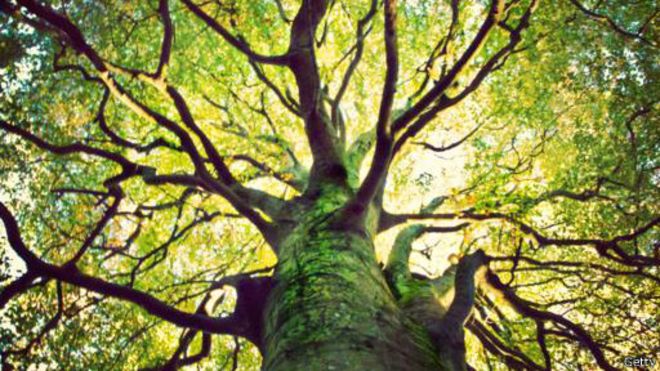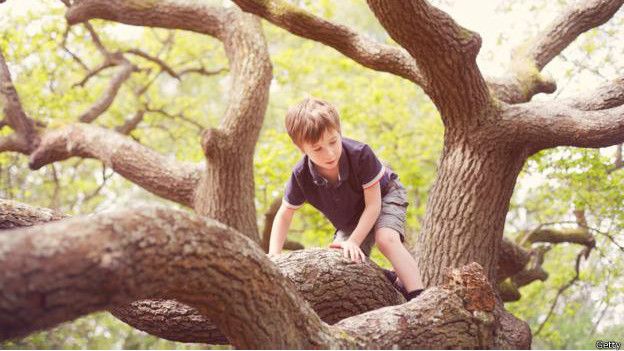拯救那些正在消失的词汇
BBC双语阅读菲奥纳·麦克唐纳(Fiona Macdonald)(2023年12月10日)

《地标》一书收集了 30 种方言的词汇(图片来源:Catherine MacBride/Getty Images)
罗伯特·麦克法兰是一名词汇编纂者——在灌木篱墙、盐沼和海蚀洞之间探险。他也称得上是个魔术师——他能利用消失的短语施加魔法,勾起我们与自然景观间不同联系的回忆。在其最新著作《地标》(Landmarks)中,这位英国自然学家呼吁“编制一个地球魅力词汇表,让大自然能与我们呼应,并帮助我们倾听。
在《地标》一书中,麦克唐纳收集了英国和爱尔兰的 30 种语言、方言和次方言,并汇集成为 9 个词汇表。这些词汇均用于描述天气、自然界和地形的方方面面,其中的一些已濒临灭亡,在曾经使用它们交谈的人们口中逐渐消失。它们已被人们遗失。麦克唐纳希望人们再找到这些词汇。
他这样描述自己最喜欢的两个词汇:“一个可爱的词是康沃尔郡方言‘zawn’,意思是海崖上被波浪撞击的裂口——张大嘴巴,威力呼之欲出的感觉。另一个词是轻柔的盖尔方言‘rionnach maoim’,它是指有风的日子里云朵落在荒野的影子。我们就是需要有这样一个轻柔的短语,准确、凝练而富有诗意地描述这种现象。”
《地标》一书中除了农业和地理术语,也收录了诗人们创作的词汇。其中就包括 19 世纪诗人约翰·克莱尔(John Clare)发明的短语‘shepherd’s lamp(牧羊人的灯)’,诗人用它描述日落后升起的第一颗星。另外,书中还收录了由维多利亚时代诗人杰拉尔德·曼利·霍普金斯(Gerard Manley Hopkins)创作的的点滴词汇:‘heavengravel’指冰雹,‘endragoned’描述咆哮的大海,而不祥的‘doomfire(末日之火)’,麦克法兰认为它是“向末日来临般的夕照”。
麦克法兰陶醉于语言之中。“语言中不仅有精确表达的纯粹乐趣,我认为它还是一种优雅的体现。这些词汇融入可爱的诗篇中,又像玩偶盒一般弹出来,它们是了不起的精确表达形式。”他这样说。词汇表中有‘zwer’(埃克斯穆尔高地方言,意思是“一群鹧鸪起飞发出的声音”,‘frazil(冰针)’(“松散的针状冰晶在汹涌而来的冰凉水中形成的泥浆,例如,在寒冷夜晚的河水中”),还有‘blaze’,在北海海岸地区,它的意思是“打着手电,在晚上用三叉矛突袭捕获三文鱼”。
正如所料,在英国,有各种表达下雨的词汇,它们大多数来自盖尔语。比如‘virga(雨幡)’,意思是“从云中坠落的可见降水雨线或雨道,但在到达地面前已经蒸发”,‘beum-sléibhe’意思是“雷雨云爆裂引起的突发洪流”,一点一滴都有说明。有些词汇的定义富于抒情,如‘smirr’是指“极细微的雾雨,从远处看很像烟尘”,再如‘burraghlas’是指“汹汹涌来的无情愤怒”。有些词汇的定义则更为平淡无奇,如‘clagarnach’是爱尔兰语中的“大雨落在铁屋顶上的哗啦声”,再如‘letty’是“让户外作业难以进行的大雨”。
但《地标》不仅仅是对语言的一曲颂歌。麦克法兰相信,通过丰富我们的词汇,我们还能改变与自然景观的互动方式。“在描述自然界时,我们越来越凑合使用缺乏创造性的通用语言:如‘field(田野)‘wood(树林)’和’‘hill(小山)’‘countryside(乡村)’。这些都是很基本的表达方式,我们有时候需要泛泛而谈,这也无可厚非,”他表示,“我们说话时不能总做到绝对准确。但我对细节、自然界的细节及其特殊性很着迷,而语言能帮助我们了解到这些。”
在书的开始部分,麦克法兰描述了自己乘坐双涡轮螺旋桨飞机飞过苏格兰外赫布里底群岛(Scottish Outer Hebrides)上空的情况。当时,与他隔着过道的两个人正看向窗外。麦克法兰讲道:“其中一个人大笑。她说,‘我们飞过的地方空空如也!’。
种子基金

书最后的词汇表名为“孩子气”
麦克法兰告诉我,“如果我们仅仅把一处风景看成是某种空间的浪费,缺乏细节,就更容易导致轻视、漠不关心或是不当使用。”
在《地标》中,他引用了美国随笔作家和农场主温德尔·贝瑞(Wendell Berry)的话:“人们一边利用自认为有价值的东西,一边却要捍卫所爱,而捍卫所爱就需要一种具体化的语言,因为我们会热爱自己特别了解的东西。”
书中有一章专门讲述苏格兰裔美国人约翰·缪尔(John Muir),正是受到此人作品的启发,美国总统西奥多·罗斯福(Theodore Roosevelt)才建立了美国第一个国家公园。麦克法兰说,“缪尔给我带来希望,他的作品改变了自然景观的历史进程。这是黑暗中的希望之光。”他描述了狐尾松的种子:它会在土壤中休眠,然后在林火过后发芽。“艺术、写作等文化中的个人行为就像是坠落的松树种子。它们现在似乎是死了,但几十年后就会重新焕发生机。”
《地标》是一部伟大的学术著作,同时也是对行动的呼吁。它探讨了“阅读怎样能让人转变思想、调整行为、塑造观念。”这本书正好呼应了英国自然写作的复苏,科斯塔图书奖获奖作品《鹰和牧羊人的生活》(Hawk and The Shepherd’s Life)就是其中的例子,这是一部牧羊人的回忆录。
麦克法兰相信,目前有一股“惊人的文化力量在涌动,它体现在摄影、艺术和文学等方方面面。”他将之归因于严重的失落感。他说:“因为我们生活在破坏和损失的阴影中,因为我们是成长过程中意识到气候变化的一代,对世界面临的持续威胁的内化焦虑是一种真正强大而富有想象力的力量,虽然我们无法窥其全貌,但它却已深深植根于我们心底。”
‘消失的词汇一览表’
麦克法兰之所以萌发写这本书的想法,是由于他发现了一部“英国赫布里底群岛土著盖尔语词汇表”,随后他又从《牛津小词典》(Oxford Junior Dictionary)挑选了如‘buttercup(毛茛属植物)’和‘kingfisher(翠鸟)’等自然词汇,由此编纂而成为他所说的“消失的词汇一览表”。他认为,我们能从儿童接触大自然的方式中学到东西。
他说:“书中最后一章讲述了某个国家公园中的一群孩子的故事。国家公园一侧是英格兰东部最为繁忙的一条 A 级道路,另一侧则是一所医院。孩子们即使在泛善可陈的地方也能发现无穷的奇妙,这对我们所有人都是一个启发,我们都忘记该怎样‘孩子气’地说话了。”
与消失的词汇同样重要的是,每天都有新的词汇源源不断地出现。麦克法兰在书中谈到,当他告诉自己 7 岁的儿子,没有描述“小溪水下鹅卵石上升起的闪闪水波”的词汇时,他的儿子很快就建议可以用‘currentbum’这个词。麦克法兰告诉我,“自从本书出版后,我收到人们发来的许多词汇——它们来自明信片、信件、日记和剪报还有电子邮件和推特,孩子们和父母们都开始把他们要补充的词汇发给我。”
《地标》一书中收集的词汇并非是一种形式上的收藏,而是对控制词汇消失的一个尝试。在 Hay 访谈中,麦克法兰表达了自己的希望,他希望本书能为书中的方言带来新生。他说:“我希望这些词汇能释放能量,迸发其中的诗意。”
为此,书最后的词汇表“Childish”是一个留白的页面。这是一个希望的印记。正如麦克法兰在《地标》中所言,“我们已经遗忘了描述自然景观的 10,000 个词汇,但假以时日,我们还会创造出 10,000 个新词汇。”
我们已经遗忘了描述自然景观的 10,000 个词汇,但假以时日,我们还会创造出 10,000 个新词汇。
这样以来,他的词汇表也就远远超出了词汇拓展的范畴。这就是魔术师麦克法兰大显身手的时候了。
“我希望这些词汇真正成为魔法、儿歌,咒语——你进入其中就好像踏入一条流动的溪流,让这些词汇缓缓流过你。它们自有魔力,这与我无关。我只是将它们收集在一起。”他说,“但它们本身就在散发魅力。”
(责编:友义)
The vanishing words we need to save
By Fiona Macdonald,10 December 2024
We speak on the phone the day before he is due to talk at the Hay Festival. I am sitting in my car at a rest stop next to the river Wye in Wales, opposite public toilets, trying to stay still to keep my mobile from cutting out. Macfarlane is in the kitchen of his home in Cambridge, also clinging to a patch of reception. He laughs as I describe my location. This is a man who has found peregrine falcons at a power station and water voles at a municipal dump, claiming in his 2007 book The Wild Places that “the human and the wild cannot be partitioned”.
Similarly, he doesn’t believe that the words he has collected in Landmarks are just for shepherds or hill-walkers. “I’m talking to you from my edge-of-the-suburb house in Cambridge – most people are in cities now,” he says. “The book is about all of us finding ways to celebrate and enrich the language that we have for landscape and nature.”
In Landmarks, Macfarlane pulls together nine glossaries of terms taken from 30 languages, dialects and sub-dialects around Britain and Ireland. They all describe aspects of weather, nature and terrain – and many of them are dying out, slipping out of conversation and off the tongues of those who once spoke them. They have been lost. Macfarlane wants them to be found.
He describes two of his favourites: “One is this lovely Cornish word ‘zawn’, which means a wave-smashed chasm in a sea cliff – it’s so evocative of that gaping mouth, and the power of those places,” he says. “Another is this soft, Gaelic phrase ‘rionnach maoim’, the shadows that clouds cast on moorland on a windy day. There’s something about the poetry of that, the precision and the need to compress that phenomenon down into that gorgeous soft phrase.”
In his book’s lists, he has included words coined by poets along with agricultural or geological terms. There is the ‘shepherd’s lamp’ imagined by the 19th-Century poet John Clare to describe the first star that rises after sunset, and a smattering of terms from the Victorian poet Gerard Manley Hopkins: ‘heavengravel’ for hailstones, ‘endragoned’ describing a raging sea, and the ominous ‘doomfire’ – meaning, as Macfarlane puts it, “sunset light which has the appearance of apocalypse to it”.
Macfarlane delights in the language. “There’s just the sheer joy of exactitude; I see it as a form of beautiful elegance. These lovely poems that fold up inside these words and spring out of them like jack-in-the-boxes – they’re gorgeous forms of precision,” he says. The glossaries include ‘zwer’ (Exmoor dialect for “the noise made by a covey of partridges rising in flight”), ‘frazil’ (“loose, needle-like ice crystals that form into a churning slush in turbulent super-cooled water, for example in a river on a very cold night”) – and ‘blaze’, which along the North Sea coast means “to take salmon by striking them at night, by torchlight, with a three-pronged spear”.
‘Blaze’, which means ‘to take salmon by striking them at night, by torchlight, with a three-pronged spear’
As might be expected in Britain, there is an entire list devoted to words for rain, most of them Gaelic. From ‘virga’, meaning “observable streak or shaft of precipitation that falls from a cloud but evaporates before reaching the ground”, to a ‘beum-sléibhe’, or “sudden torrent caused by the bursting of a thundercloud”, every drop is accounted for. Some of the definitions are lyrical – like ‘smirr’, “extremely fine, misty rain, close to smoke in appearance when seen from a distance”, and the “torrent of brutal rage” that is ‘burraghlas’. Others are more prosaic, like ‘clagarnach’, Irish for “clatter of heavy rain on an iron roof”, and ‘letty’, “enough rain to make outdoor work difficult”.
But Landmarks is more than an ode to language. By enriching our vocabularies, Macfarlane believes, we can change the way we interact with our landscape. “We increasingly make do with an impoverished language for nature, a generic language: ‘field’, and ‘wood’, and ‘hill’, and ‘countryside’. It’s a very basic way of denoting, and that’s fine, and sometimes we need to speak generally,” he says. “We can’t always speak absolutely precisely. But I’m fascinated by details and by the specifics of nature, and its particularities – and language helps us to see those.”
We increasingly make do with an impoverished language for nature: ‘field’, and ‘wood’, and ‘hill’, and ‘countryside’
Early in the book, Macfarlane describes flying over the Scottish Outer Hebrides in a twin-prop plane. He saw “the tawny expanse of Mointeach riabhach, the Brindled Moor: several hundred square miles of bog, hag, crag, heather, loch and lochan that make up the interior of Lewis”. Across the aisle from him, two people looked out of the window. Macfarlane recounts: “One of them laughed. ‘We’re flying over nothing!’ she said.”
Seed fund
“If we just see a landscape as some kind of waste space and devoid of detail, it becomes more vulnerable to dismissal or disinterest or improper use,” Macfarlane tells me.
In Landmarks, he quotes the American essayist and farmer Wendell Berry: “People exploit what they have merely concluded to be of value, but they defend what they love, and to defend what we love we need a particularising language, for we love what we particularly know.”
A chapter in the book is dedicated to the Scottish-American John Muir, whose writings inspired the US president Theodore Roosevelt to create the country’s first national parks. “Muir gives me hope,” Macfarlane said in his talk at Hay. “His writing changed the course of landscape history. It’s the idea of hope in the dark.” He described the seeds of the bristlecone pine, which lie dormant in the soil and are germinated by forest fire. “Individual actions in culture – art, writing – can be dropped, like the pine seeds. They seem dead but decades later they can flare into life.”
Subtitled a “field guide to the literature of nature”, Landmarks is a work of great scholarship – but also a call to action. It explores “how reading can change minds, revise behaviour and shape perceptions”. And it fits within a wider resurgence of nature writing in Britain, including Costa award-winning H is for Hawk and The Shepherd’s Life, the memoir of a sheep farmer.
Macfarlane believes there is an “astonishing surging cultural energy that’s working across photography and art and in literature”. He credits it to an acute sense of loss. “It’s because we live in the shadow of destruction and damage, because we are a generation that’s grown up conscious of climate change, and that internalised anxiety at the world’s ongoing peril is a really powerful imaginative force that we don’t quite register in its full form but is deeply in us,” he says.
‘An A-Z of words lost’
Macfarlane was inspired to write the book both by discovering a “peat-deep word-hoard of Hebridean Gaelic” and after the culling of nature words such as buttercup and kingfisher from the Oxford Junior Dictionary, which he described at Hay as “an A-Z of words lost”. He thinks we can learn from how children encounter nature.
“The last chapter is about a group of children in a country park which has the busiest A road in the east of England on one side, and a hospital on the other,” he says. “It’s about the limitless wonder with which children meet even a very unwild place, which is an inspiration to all of us who’ve forgotten how to speak ‘childish’.”
Just as important as the words that are vanishing are the words being created every day. Macfarlane explains in the book that his seven-year-old son, when told there was no word for “the shining hump of water that rises above a submerged boulder in a stream”, quickly suggested ‘currentbum’. “Since the book was published, I’ve been sent many words – on postcards, and letters, from diaries and clippings, as well as emails and Twitter – and children and parents have begun to send me ones that they make up,” Macfarlane tells me.
The collecting of terms in Landmarks is not a form of hoarding, an attempt at control in the face of loss. At his Hay talk, Macfarlane expressed how he hoped the book might give new life to the place-languages within. “I want these words to be released and let their energies and their poetries run wild,” he said.
To that end, the last glossary, Childish, is left blank. It is a sign of hope. As Macfarlane says in Landmarks, “We have forgotten 10,000 words for our landscapes, but we will make 10,000 more, given time.”
We have forgotten 10,000 words for our landscapes, but we will make 10,000 more, given time.
His glossaries, then, are much more than vocabulary-expanding lists. This is where Macfarlane the magician takes over.
“I wanted them to become spells, really; chants, incantations – you step into them like you might step into a flowing stream and let the words run over you. They do have their own magic, which is nothing to do with me. I just put them on the page,” he says. “But they become spells.”